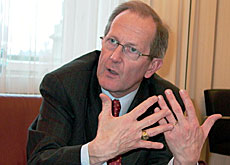
Deiss warns of crisis if labour vote fails

Economics Minister Joseph Deiss tells swissinfo that a crisis could ensue if voters reject a proposed labour accord with the European Union.
The Swiss electorate is due to decide on September 25 whether to extend an existing treaty with Brussels to the ten countries which joined the EU last year.
Swiss voters are having the final say on closer ties with the EU for the second time this year.
In June they approved an accord on closer security and asylum cooperation as part of a series of bilateral agreements.
swissinfo: What is the political and economic importance of the labour accord with the ten new EU countries?
Joseph Deiss: The labour accord with the EU allows us to extend our contractual framework with Switzerland’s most important trading partner.
A “yes” would secure jobs in Switzerland and keep the country attractive for foreign investors and Swiss companies.
swissinfo: In June the Swiss voted on closer security and asylum cooperation with Brussels, the forthcoming poll is about granting access to the labour market. Which of the two votes is more important?
J.D.: It is always difficult to draw comparisons of this kind. The June vote only affected the specific agreement at issue.
Whereas the labour accord is directly linked to the other six accords of the first set of bilateral agreements concluded in 1999. Those include agriculture, research and transport.
A “no” would put all of them in jeopardy, and with them, our policy of bilateral agreements in general.
A negative outcome may well set us back to square one in our relations with the EU.
swissinfo: What impact would a rejection of the labour accord have on ties between Bern and Brussels?
J.D.: We can’t foresee the reaction of Brussels. But our relations with the EU would undoubtedly be in a crisis.
A “no” would damage Switzerland’s image and its reputation as a reliable partner. It could also have a negative impact for Switzerland’s export-oriented businesses.
swissinfo: Does the government have a worst-case scenario ready in case of a “no”?
J.D.: It is not possible to prepare such a scenario because we don’t know what steps the EU would take. We would certainly contact Brussels immediately to find out their intentions.
The EU is unlikely to make a decision from one day to the next. This is a mixed blessing, however, as it would create an atmosphere of uncertainty and thus have a negative effect on investments in Switzerland.
swissinfo: How much longer can Switzerland continue the policy of bilateral accords?
J.D.: Switzerland’s relations with the EU continue to develop, even in areas where we already have bilateral agreements.
Keeping existing agreements up-to-date, or possibly concluding new ones in areas of common interest, can be a cumbersome process.
But, it is the path the government has chosen, as it has been successful so far and it is politically feasible.
We could consider a bilateral accord on services with Brussels. Although I don’t think a third series of bilateral accords is on the horizon.
swissinfo: Is it time to open the doors for talks on full EU membership?
J.D.: I think we have to keep both issues apart. A “yes” in September is in no way a vote for or against Swiss membership in the EU.
swissinfo: What can the government do to allay fears among the Swiss that a further opening up the labour market would lead to salary dumping and more unemployment?
J.D.: We take the fears seriously, but I don’t think they are based on reality. There have been no signs of mass immigration within the EU since it opened its labour markets to the new members.
But we have taken precautions to prevent salary dumping or an unmanageable wave of immigrants by introducing transition periods and quotas.
We have also introduced strict controls and there is a threat of sanctions against those who undercut labour conditions in Switzerland.
It is true that there have been some problems when the cantonal authorities began to apply the controls, but the measures in place are now working efficiently. Abuses of the system do occur, that is true, but there are only very few cases.
swissinfo: To what extent do you agree with economic forecasts that approval of the labour accord with ten new EU countries would lead to growth of 0.5 per cent in Switzerland’s Gross Domestic Product?
J.D.: I’m convinced that the Swiss economy would get a boost. It is crucial to create favourable conditions in Switzerland, including the opening up of the labour market and the possibility to hire much needed staff.
If we don’t succeed in keeping Switzerland attractive for business, foreign investors will go to other countries and more Swiss companies could decide to move abroad.
swissinfo-interview: Urs Geiser
Switzerland signed 16 bilateral accords with the European Union, including a deal on access to labour markets.
The EU is Switzerland’s main trading partner.
Under the new agreement 75 million citizens in the ten new EU member states, mostly from eastern Europe, would be granted gradual access to the Swiss labour market.
The Swiss authorities have introduced quotas and measures to prevent salary dumping and a wave of immigration.

In compliance with the JTI standards
More: SWI swissinfo.ch certified by the Journalism Trust Initiative


























You can find an overview of ongoing debates with our journalists here . Please join us!
If you want to start a conversation about a topic raised in this article or want to report factual errors, email us at english@swissinfo.ch.